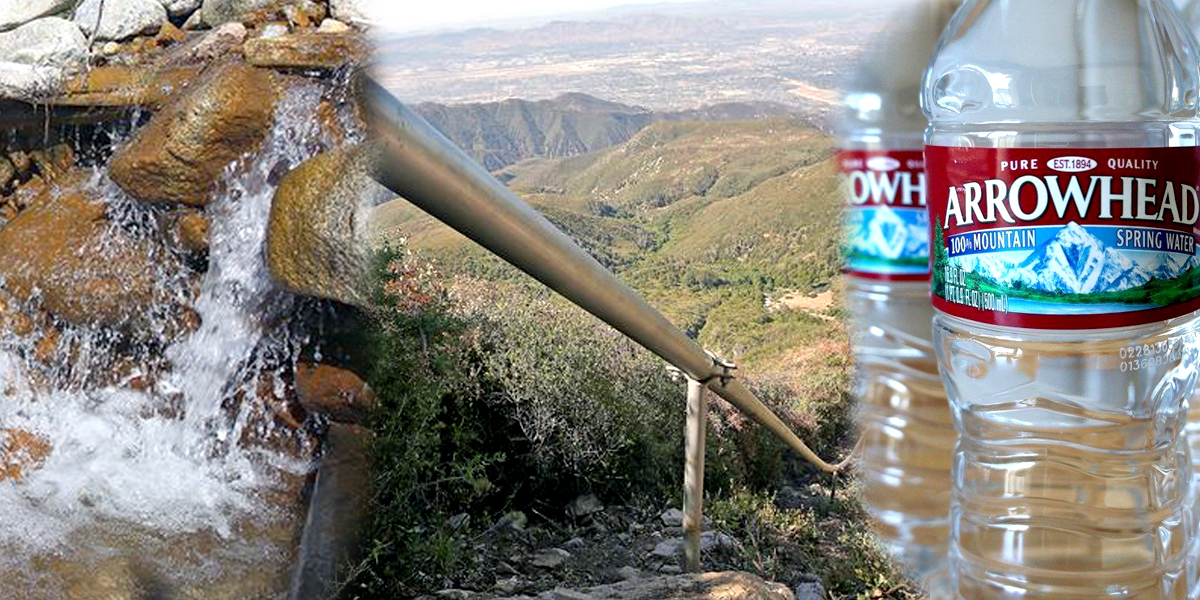
Nestlé Can Keep Piping Water Out of Drought-Stricken California Despite Permit Expiring in 1988

In a major setback for environmental groups, a federal judge in California has tossed out allegations that the U.S. Forest Service allowed Nestlé’s bottled water operation to take water from the San Bernardino National Forest on a permit that expired back in 1988.

The decision regards a lawsuit filed against the Forest Service in October 2015 by the Courage Campaign Institute, the Center for Biological Diversity and the Story of Stuff Project. The groups alleged that the agency was allowing Nestlé Waters North America to pipe water from public lands on a permit that had long expired.
With the ruling, the multinational food and drink corporation can continue its use of a four-mile pipeline that siphons thousands of gallons of public water a day from the Strawberry Creek watershed and sell it back to the public as bottled water. The water is sold under the Arrowhead brand.
U.S. District Judge Jesus Bernal wrote in a Sept. 20 order that since the Forest Service received a request to renew the permit in May 1987, the effort was considered a “timely and sufficient application for renewal,” thus keeping the original permit valid.
Bernal rejected the plaintiffs’s argument that the Forest Service’s failure to act on the May 1987 request renders the permit invalid.
“Plantiffs do not identify, and the court cannot find, any authority holding that an agency’s failure to act within a reasonable time” invalidates a special use permit, Bernal wrote.
The decision was criticized by the three environmental groups that initiated the lawsuit.
Federal Court Denies Request to Turn Off Nestlé Spigot Despite Decades of Water-taking in San Bernardino Nati… https://t.co/rzY46NRAOm
— Center for Bio Div (@CenterForBioDiv) September 21, 2016
“The court has just confirmed what many Americans fear, massive corporations play by a different set of rules than the rest of us,” Eddie Kurtz, executive director of Courage Campaign Institute, said in reaction to yesterday’s decision. “Nestlé has been pulling a fast one for nearly 30 years, taking a public resource, depriving plants and animals of life-sustaining water, and selling that water at an obscene profit without the right to do so, but apparently our justice system is OK with that.”
“We’re shocked by the court’s decision to let Nestlé continue its operations, and we will continue to stand with hundreds of thousands of Californians and people across the nation to take back control of this public water,” added Michael O’Heaney, executive director of the Story of Stuff Project. “This fight is far from over.”
Let’s not forget that California is experiencing its fifth year of an epic drought. The Center for Biological Diversity pointed out that in 2015 alone, Nestlé had piped away an estimated 36 million gallons of water from the forest to sell as bottled water. Nestlé pays an annual permitting fee of $524 for permission to run its pipeline.
5 Signs the California Drought Could Get Worse http://t.co/GFcjVIDE0r @tcktcktck @globalgreen @OccupySandy
— EcoWatch (@EcoWatch) May 18, 2015
“Reports from the end of 2015 and the summer of 2016 indicate that water levels at Strawberry Creek are at record lows, threatening local wildlife that are already dealing with the ongoing drought in Southern California,” the Center for Biological Diversity said.
“The court’s decision is disappointing, but the real tragedy lies in the fact that Strawberry Creek is drying up, dooming the plants, fish and animals that have relied on it for tens of thousands of years” said Ileene Anderson, senior scientist with the Center for Biological Diversity. “Bottling water is not worth sacrificing Strawberry Creek, so we’re considering our options for appeal.”
Environmentalists have long decried bottled water as wasteful, expensive, unnecessary and a major source of plastic pollution.
Why We Must Stop Drinking Bottled Water https://t.co/lDUDYZc4Yc @foeeurope @globalactplan
— EcoWatch (@EcoWatch) November 23, 2015
Annie Leonard, the executive director of Greenpeace USA, argued in November: “A four-year review of the bottled water industry in the U.S. and the safety standards that govern it, including independent testing of over 1,000 bottles of water found that there is no assurance that just because water comes out of a bottle it is any cleaner or safer than water from the tap. In fact tap water is tested more frequently than bottled water.”
Nestlé Waters was not a party in the case but told EcoWatch in a prepared statement it was “pleased” with the ruling.
“The Forest Service has acknowledged that our permit is in full force and effect until the renewal process is concluded,” Christopher Rieck, spokesman for Nestlé Waters North America Inc., said. “We look forward to working in close cooperation with them to continue to manage the Arrowhead Springs in Strawberry Canyon sustainably for the long-term.”
The company added that it recognizes “the impact the drought is having across the state, and we have implemented new technologies in our California facilities that will conserve 55 million gallons of water each year.”
Nestlé carefully monitors all spring sources and manages them to ensure long-term sustainability and healthy habitats, he said.
Nestlé Plans to Bottle Water From Drought-Stricken Phoenix https://t.co/Eo2AgOJzET @TheCCoalition @EUClimateAction
— EcoWatch (@EcoWatch) July 4, 2016

 233k
233k  41k
41k  Subscribe
Subscribe 